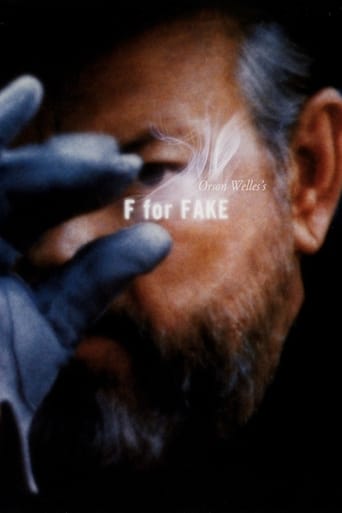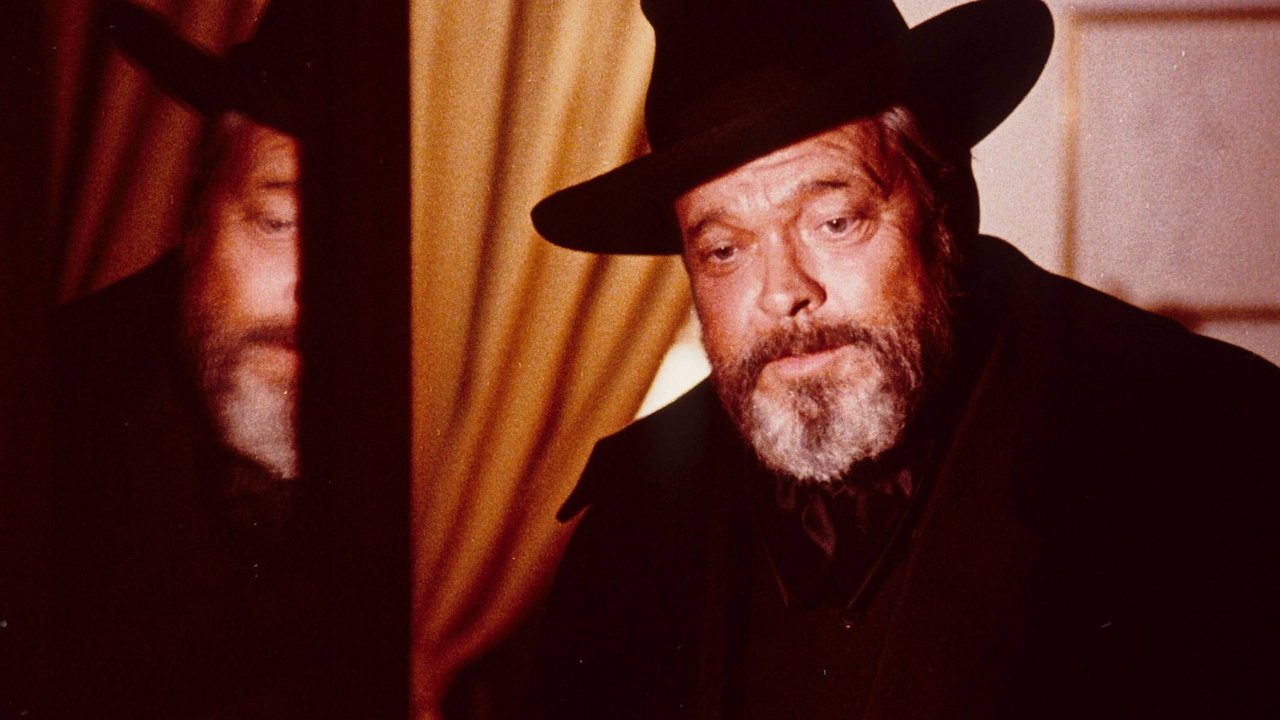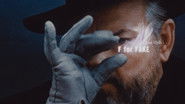ironhorse_iv
Known in France as 'Truths and Lies'; 'F for Fake' is far from serving as a traditional documentary. Made in 1974, the film is a blend of quick time, dreamlike French New Wave attention-deficit editing. Remind me of Jean Luc Godard and René Clair who used editing to alternately build and deconstruct. It was very surreal, yet somewhat annoying. The whole overused of dated freeze frame was irritating. Despite that, I did like the breaking the fourth wall style filmmaking, with a flair of very questionable information journalism by an unreliable narrator. Welles's rambling is spell-bounding. I like that Welles also draws parallels between the main subject and his own brush with early notoriety. Orson Welles does wonders as the voice of God for this film. I also, kinda dig the fictional movie re-enactments with him, using film noir styles. All of the smoke and mirrors, work for this film, very well. Even if some of them, were cut with odd unrelated footage such as opening staring/airport scene. I guess, Orson Welles just wanted showcase how hot his companion, Oja Kodar, was with the endless amounts of butt shots and nudity. Welles even filmed a trailer that lasted for nine minutes and featured several shots of a topless Kodar. The trailer was rejected by the US distributors to no surprised. I think, Welles went a little overboard with the whole 'trophy wife' concept. In truth, her presence in the film wasn't really needed, as she has nothing to do with the main stories. While, her scenes are somewhat pointless. It's still somewhat fit with the theme of the film. So, it's really hard to say, if this movie was documentary at all. It really broke the standards mode of what is documentary with. For me, it felt more like a participatory docufiction. It's clear by the recent events that happen during production that is impossible for original director François Reichenbach to make an observational type film about fame art forger, painter Elmyr de Hory. So, he first hired B-movie cinematographer Gary Graver to help finish the film. While, he did contributes all footage filmed in the U.S., his work was very choppy. His interviews with Hory and Irving barely explain, anything about the guy, such as Elymr de Hory's jail-time and his open homosexuality. What we are left with is an incomplete picture of de Hory, a complex, but highly enigmatic man unable to shed his outlaw persona, whose notions of morality conformed to the exigencies he believed, that helps with his survival. Sadly, we will never truly know, who the real guy is, as he commit suicide, shortly in 2 years after this movie wrap. Fearing that no audience member, would take the film's seriously. Reichenbach then hired fame director Orson Welles to edit the documentary to include Elmyr de Hory's biographer Clifford Irving, who was revealed to be a forger himself, when his fame Howard Hughes "autobiography" came out to be, a hoax. It soon become aware to Welles, with the circumstances of the production, he can instead, turn the documentary into a meditation on the nature of fakery particularly with regards to authorship and authenticity within the three main media of art: writing, illustration and filmmaking. Without spoiling the movie, too much, I have to say, this performative documentary was very exceptional for its thought provoking subject. You really don't know, what to believe. It's hard to know, what's real and what's not, with this film and whether, does it ultimately, even matters. After all, Welles reflects on this in-film, so well. He suggest that maybe authenticity isn't important to art, because everything will finally wear away by time. No matter, if it's fake or not. It doesn't matter all that much, in the long scheme. In many ways, that was the perfect way to end the film. However, it wasn't. In short, I guess, Orson Welles wanted to troll his audience, a little more, by adding 17 more minutes to the runtime, to show how fake, this movie can get. In the end, he wanted the final laugh. Overall: For a long time the film was Welles' final film, until the posthumous release of 'The Other Side of the Wind' in 2015. In a way, it's should had been. It was a wonderful entertaining film. Remind me, so much of 2010's documentary, 'Exit through the Gift Shop' with its questionable confusing artist style. Highly recommended. It really deserves to be in the Criterion Collection, big time.
gavin6942
A documentary about fraud and fakery, which focuses on Elmyr de Hory's recounting of his career as a professional art forger.Clifford Irving is something of a legend, and definitely belongs in this film for his work as author of a fraudulent Howard Hughes authorized biography. This film purports that Irving and deHory both worked their schemes from the same tiny island, and yet were in no way connected.Sadly, De Hory would commit suicide a few years after the release of Welles' film, on hearing that Spain had agreed to turn him over to the French authorities."F for Fake" faced widespread popular rejection. Critical reaction ranged from praise to confusion and hostility, with many finding the work to be self-indulgent and/or incoherent. "F for Fake" has grown somewhat in stature over the years as cinephiles revere almost anything the notorious filmmaker made.The question remains: how much of this film itself is true or just one big hoax?
blanche-2
"F for Fake" is a documentary by Orson Welles, who thought this movie had commercial prospects. Welles had a tough time in his filmmaking life, especially once he went to Europe. He knew art, he knew creativity, he didn't know business. The saddest thing about the book Barbara Leaming wrote about Welles is toward the end, when he has dinner with Steven Spielberg in the hope that Spielberg would help him find a distributor for his latest film. But all Spielberg wanted to do was talk about Citizen Kane. Leaming's recounting of her phone call with Welles is heartbreaking -- a great artist with nowhere to go with his art. Today, had he lived, his films would be widely accepted. His later ones were too out there for American audiences, and I don't think that Steven Spielberg, even if he had tried, could have gotten him a distributor.F for Fake has unusual editing that we wouldn't see again for another 10 years, and that is the remarkable thing about it. It's very ahead of its time. The documentary is about fakes, mainly two big ones: Elmyr de Hory, who could replicate the great art masters such as Modigliani, Picasso, Matisse, etc., and actually sold these works to museums; and the con man extraordinare, Clifford Irving, who wrote a book about de Hory and then wrote a bio of Howard Hughes, based on interviews and meetings with him, none of which had ever taken place.There's a free-wheeling, improvised feeling to this documentary. For me, it ran a bit long and was a little too disjointed. Welles' beautiful girlfriend in his last years, Oja Kodar, is showcased in one story at the end of the film. Welles is a wonderful narrator and guide.Part of Welles' problem, in my humble opinion, is that he hated structure, rebelled against the confines and demands of the studios, and yet needed the discipline in order to finish anything. People say that he couldn't finish anything. He would run out of money and steam. I don't think it's that he didn't want to finish his films. I think he was a rebel with a cause. The cause was filmmaking. The business side? Couldn't handle it.
Michael_Elliott
F for Fake (1973)** 1/2 (out of 4) Orson Welles' final major picture started off as a documentary on art forger Elmyr de Hory but when that project led to an interview with Clifford Irving, the man who wrote the fake Howard Hughes biography, the documentary took a new turn and decided to look at fakes all around. This really isn't your typical documentary and many critics of the film will say it makes very little sense and all in all is nothing more than an incoherent mess. I wouldn't go that far but I think F FOR FAKE is certainly more style than actual substance. I say that because Welles visual style here is something that you didn't see in documentaries at the time and I'd say that nothing that followed really looked the same. The documentary has an avant garde feel to it and most of them comes from the editing. The editing goes all over the place with all sorts of weird edits, different styles of cameras being used and the editing usually takes the story and tells it in a different time frame and I think this is where people get lost. The look of the film is certainly something impressive and you really can turn the volume down and be entertained just by the look that Welles made. However, this "style" is so good that it really takes away from the stories being told and I think it really kills most of the interest in the subjects. I think the way the story goes back and forth does make the film incoherent but this is also due to the fact that the material just isn't worth following. I think had Welles made a more traditional documentary then the story would have been more entertaining. As is, the story just gets lost in the style and in the end you really don't learn anything about either man. We even get a quick clip about The War of the World hoax that landed Welles not in jail but in Hollywood. What actually keeps the film entertaining is the performance of Welles being himself and hosting. He comes off so good and charming that it at least keeps you awake even when the story itself goes under. F FOR FAKE is considered by some to be horrid while others see it as another Welles masterpiece. I'm in the middle thinking it shows some signs of greatness but in the end it's just too rough around the edges to really work.



 AD
AD







